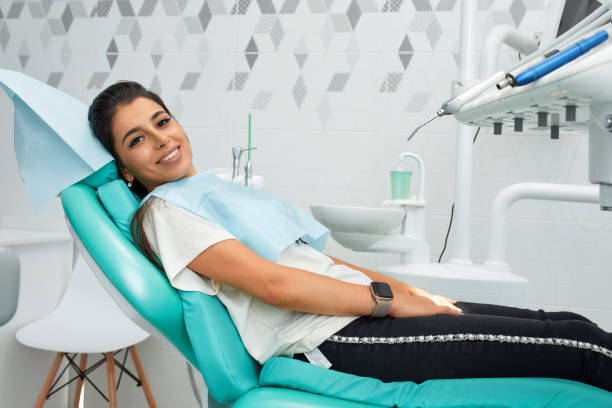
Overview of dental caries prevention.Woman at the dentist's chair during a dental procedure. Beautiful Woman smile close up. Healthy Smile. Beautiful Female Smile.
Keep Your Smile Healthy with Regular Dental Cleanings
Good oral hygiene does more than keep your teeth white. It plays a major role in your overall health and well-being. Brushing and flossing daily is essential, but it’s not enough on its own. That’s why dental cleanings are an important part of every person’s health routine. These cleanings remove harmful plaque and tartar that home care often misses. In this guide, we’ll explain what happens during a cleaning, why it matters, and how it ties into preventive dentistry.
The Importance of Dental Cleanings
Plaque is a sticky film that builds up on teeth. If left too long, it hardens into tartar. This creates a home for harmful bacteria that can lead to cavities and gum disease. Once tartar forms, only a dental professional can remove it safely. Routine dental cleanings remove both plaque and tartar, preventing decay and infections. Without them, bacteria can spread below the gumline and damage bone. Cleanings not only protect your teeth but also improve breath and reduce inflammation. They form a critical part of preventative dental care by stopping problems before they start.
What Happens During a Dental Cleaning?
A dental cleaning is a simple, non-invasive procedure. It usually starts with a dental hygienist checking your mouth for signs of gum disease or other concerns. Then, they use tools to remove plaque and tartar above and below the gumline. Next, your teeth are polished to remove surface stains. A final flossing helps clear away any debris. In some cases, a fluoride treatment may be applied for extra protection. The entire process is painless and takes about 30 to 60 minutes. These regular dental cleanings are one of the best things you can do for your smile.
How Often Should You Get a Dental Cleaning?
Most dentists recommend cleanings every six months. However, this can vary based on your oral health. People with gum disease or other issues may need more frequent visits. Those who maintain good brushing and flossing habits between visits usually do well with two cleanings per year. If you’re unsure, your dentist can suggest the right schedule. Regular appointments are a key element of preventative dentistry, helping you avoid more serious and costly treatments later on.
The Connection Between Cleanings and Overall Health
Oral health affects more than just your mouth. Bacteria from gum infections can enter your bloodstream and spread to other parts of the body. This has been linked to heart disease, diabetes, and even pregnancy complications. Getting routine dental cleanings helps reduce this risk by removing bacteria before it spreads. They also give your dentist a chance to spot early signs of disease. Preventing these issues before they escalate is the goal of preventative dentistry, making cleanings an essential part of staying healthy.
Benefits Beyond the Basics
There’s more to cleaning your teeth than cavity prevention. Clean teeth look brighter and feel smoother. Many people notice a big improvement in how fresh their mouth feels after a cleaning. Professional cleanings also give you a chance to ask questions and learn better care techniques. Your dental team may offer tips on brushing or suggest products suited to your needs. These small adjustments can have a lasting impact on your oral health.
How Preventive Dentistry Saves You Money
Many people avoid the dentist to save money, but skipping care can cost more in the long run. Fillings, crowns, and root canals are far more expensive than routine cleanings. Preventive dentistry focuses on stopping problems before they require costly treatment. By investing in cleanings and checkups, you avoid pain, tooth loss, and unexpected bills. Most insurance plans cover cleanings fully or at a very low cost. That means there’s no reason to wait. Even without insurance, many clinics offer payment plans or affordable cleaning options. Staying ahead of problems is always more affordable than fixing them later.
Dental Cleanings for Children and Teens
Children and teens benefit from dental cleanings just as much as adults. In fact, early care sets the stage for lifelong oral health. Kids are prone to cavities because they’re still learning to brush effectively.
Pediatric cleanings often include fluoride treatments and sealants to protect growing teeth. The dentist will also monitor how their bite is developing. These visits build comfort and trust, which helps reduce dental anxiety later in life. Plus, regular care gives kids a brighter, more confident smile.
What to Do Between Cleanings
While cleanings are vital, daily care at home is just as important. Brush twice a day with a fluoride toothpaste and replace your toothbrush every three months. Flossing once a day removes plaque between teeth that your brush can’t reach. Limit sugary snacks and drinks, and drink water often to rinse away food particles. If you grind your teeth at night, talk to your dentist about a mouthguard. Good daily habits combined with dental preventive practices create a strong defense against decay and gum disease.
Overcoming Fear of the Dentist
Many people feel nervous about visiting the dentist. This fear can keep them from getting the care they need. Fortunately, cleanings are non-invasive and quick. Dental teams today focus on patient comfort and gentle techniques. If anxiety is a concern, let your dentist know in advance. Some offices offer relaxing music, sedation options, or even therapy dogs. The more comfortable your experience, the more likely you are to return for future care. Remember, avoiding cleanings often leads to bigger issues later, which only increases stress.
Conclusion
Good oral health starts with consistency. Scheduling regular cleanings, brushing at home, and asking questions when needed all make a difference. Cleanings prevent cavities, gum disease, and costly repairs. When paired with preventive dentistry, they form a complete strategy for lifelong dental health. Make your oral care a priority. Long-term results come from simple steps taken early, and that includes regular dental cleanings.







